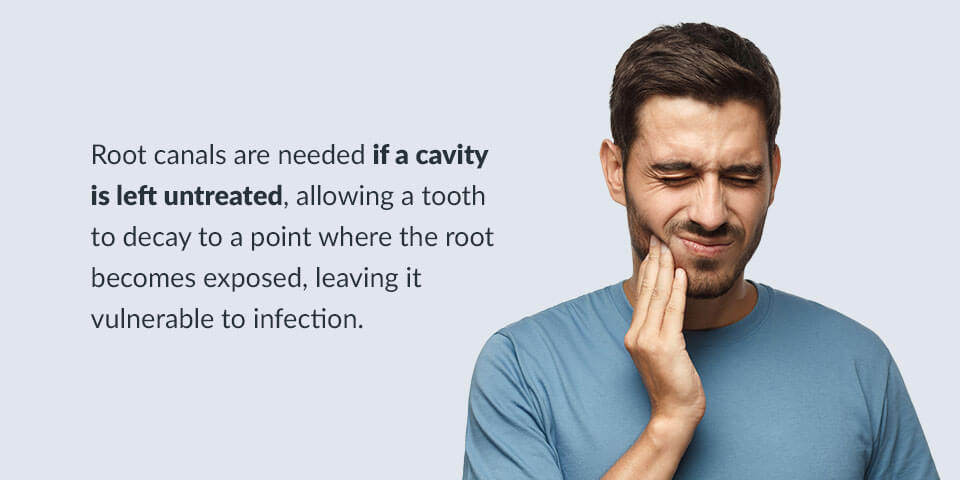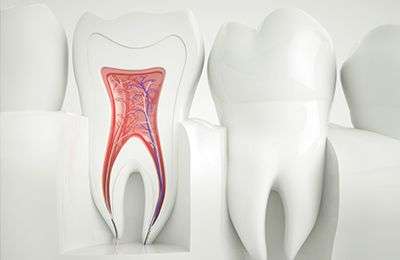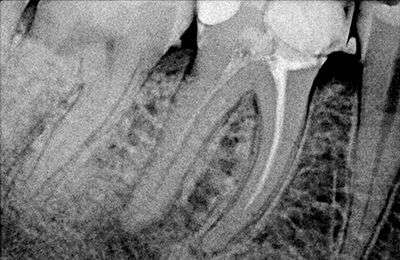How Do I Know I Need a Root Canal

Dentistry can help relieve discomfort and pain caused by tooth infections or pulpal nerve damage. Your dentist may recommend a root canal if they spot any signs of infection or nerve damage, helping save your tooth and helping you maintain your natural smile.
An untreated infected tooth can lead to a severe infection, bone loss or needing to remove the tooth. Below, you’ll learn about root canal procedures and symptoms that indicate you need a root canal to manage your oral health.
What Is a Root Canal?
Root canal treatment is done to save and repair a tooth that’s badly damaged or infected rather than removing it. Root canals are an excellent alternative to removing teeth, helping people save molars and other teeth essential for chewing.
The term root canal refers to cleaning out the canals within a tooth’s root and removing the nerve endings to eliminate tooth pain. Before advancements in modern dentistry, root canals were a painful procedure. Nowadays, dental patients can rest easy, thanks to advances in dental techniques and local anesthesia. People feel little to no pain during root canal procedures. Living with a decaying tooth is usually more painful than a root canal procedure.
Alternatives to root canals include extracting the dead tooth and replacing the tooth with an implant, partial denture or bridge. You can also seek no additional treatment if the pain isn’t bothersome. However, getting a root canal can massively improve your comfort and allow you to keep your natural teeth.
Do I Need a Root Canal?

A root canal of a tooth is necessary when bacteria invade the canal inside it, infecting the pulp and causing nerve pain. Root canals are needed if a cavity is left untreated, allowing a tooth to decay to a point where the root becomes exposed, leaving it vulnerable to infection. A cracked or damaged tooth due to trauma can also make it necessary for a root canal.
Sometimes, you may not notice signs that you need a root canal. You may not experience any pain or symptoms at first. However, many people experience specific symptoms that indicate they need a root canal, including:
- Tooth pain that doesn’t go away: You can have many dental issues that cause pain, especially throbbing pain. Exposed or damaged nerves can cause deep pain radiating to your other teeth, jaw or face, indicating you need root canal treatment.
- A tooth sensitive to touch: You may notice one of your teeth is sensitive when brushing or eating, causing shooting pain or discomfort. Sensitive teeth are one common sign you need a root canal, which can help resolve sensitivity that leads to pain.
- Sensitivity to hot or cold: Sensitivity isn’t limited to pain. Sometimes, your teeth might be sensitive to hot or cold. You may notice discomfort or pain when eating warm foods or ice cream. If you notice your teeth have become more sensitive when eating cold or hot foods, it may be time to go for a dental visit to determine if an infected tooth is causing it.
- Tender or swollen gums: An infected tooth can cause pus to collect in the affected area. As a result, your gums can become tender or swollen, which indicates a need for a root canal.
- Tooth damage: If your tooth has sustained damaged and is cracked or broken, it can leave your canals and pulp vulnerable to infection, causing pain, swelling and discomfort. If your teeth have been damaged, consult a dentist about the possibility of a root canal to relieve pain and discomfort or to address the issue before it becomes a problem.
Reasons to Get a Root Canal
Getting a root canal has several benefits for your health and well-being. If you have an infected tooth or think you might need a root canal, there are many reasons you should seek out treatment, including:
- Preventing the infection from spreading to surrounding teeth.
- Easing symptoms associated with infected teeth, such as pain or discomfort.
- Reducing the risk of jawbone damage.
- Eliminating the need for a tooth extraction.
Getting a root canal can help you save your teeth, letting you maintain your natural smile and eat the foods you enjoy. Root canals can also limit the need for ongoing dental work, which can be time-consuming, uncomfortable and expensive. Root canals are often the best choice when you have an infected tooth, and it’s best to catch an infection as early as possible to prevent further infection and the need to remove teeth.
The long-term success of root canals is around 92%, especially as advancements continue to be made in the dental field. You can rest assured a root canal can help you find relief from tooth infections, alleviating pain and discomfort that interferes with your daily life.
Schedule an Appointment for Your Root Canal at Midtown Endodontist NYC Today
BOOK AN APPOINTMENT
Trust the Professionals at Midtown Endodontist NYC for Your Root Canal
An infected tooth can be more than an inconvenience. It can also cause discomfort and pain that interferes with your daily life. Midtown Endodontist NYC is here to help. Our professionals provide high-quality care to help you find relief from your tooth pain. We pride ourselves on delivering warm, friendly service to relieve stress and make your treatment as seamless as possible.
We offer free consultations to ensure you receive the best treatment for your condition. Our payment options are flexible, offering a full spectrum of treatment at a price you can afford. We’re here to help you improve your oral health and eliminate pain and discomfort. Contact us today to learn how we can help, or book an appointment!
 Our Providers
Our Providers
 Blog
Blog
 Contact us
Contact us
 Endodontics
Endodontics
 Root Canal Treatment
Root Canal Treatment
 Emergency Root Canal
Emergency Root Canal
 Root Canal Retreatment
Root Canal Retreatment
 Complimentary Teeth Whitening
Complimentary Teeth Whitening
 Teeth Whitening
Teeth Whitening




